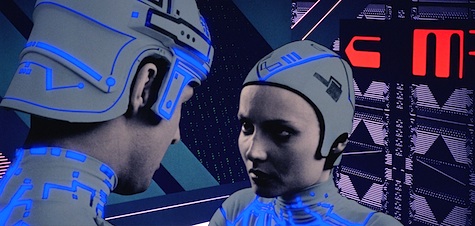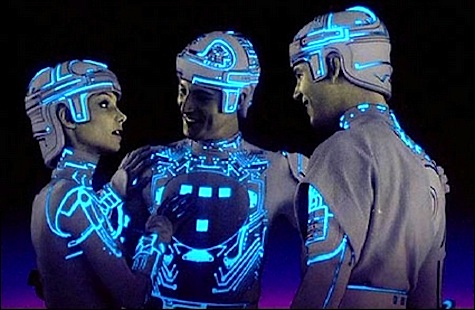Ask most people to name their favorite Jeff Bridges movie and most will probably not say Tron. (Starman, maybe?) Ask them to name their favorite Bruce Boxleitner movie, and most of them will almost certainly say Tron, and those people will be among those of us that know that Tron is a character, as well as the name of the movie (now, franchise.) Back in 2010, I was worried Tron himself wouldn’t be in the movie called Tron: Legacy and while I was partially correct, I still liked Tron: Legacy.
But not near as much as I like Bridges, Boxleitner, David Warner, Cindy Morgan, Dan Shor, Peter Jurasik and everyone else in the original film. And that’s because Tron is a movie which is aesthetically, stylistically, and conceptually peerless. This isn’t to say it’s the best science fiction movie of all time, but it might be one of the most original. It came out 30 years ago today and it’s still worth your time. Here’s why.
Big budget science fiction movies often have a desperate need pay the money invested in them, back at the box office. Often this means a sci-fi movie will attempt to be “hip” or worse, “timely” often with disastrous results. Examples of the former would be the Freddie Prinze Jr. version of Wing Commander and the latter would be Waterworld. Good science fiction movies, the ones we care about and endure are often the goofier ones that don’t care about being hip but are sometimes still timely, or at the very least, become timeless. I suppose I consider the George Pal version of The Time Machine to be in that crowd, along with the original Gojira (Godzilla).
A science fiction premise revolving around video games must have seemed like a no brainer in the 1980s, but unlike the wonderfully derivative Last Starfighter, Tron writer Steven Lisberger thought to mashup the notions hackers and computer programs with the world of video game designers. In terms of plot, these skills weren’t just for some kind of gain in the real the world with high-powered computers, but instead, informed an adventure inside of a computer network itself.
If Tron were dreamt up today, it would likely involve someone like me (a blogger) being sucked into their computer screen and then having to interact with the sentient social media versions of themselves in an attempt to find a connection between the Facebook/Twitter representation of the “the self” and the true flesh and blood real person. Tron accomplished this awesome social commentary by putting people in glowing blue suits with computer chip hats on their heads.

Once sucked inside of The Grid (again, in the heads of most moviegoers, the Internet did not exist in 1982) brilliant game designer Flynn (Bridges) must interact with living computer programs who toil away under the influence of a draconian Master Control Program. The only thing that keeps certain programs getting through their days is their beliefs in “the users” which the audience knows are actually human beings.
Tron himself (Boxleitner) is actually a fairly square “program” owing to the fact that his “user” is a guy named Alan Bradley (also Boxleitner) who is also a pretty serious person compared with Flynn. Bradley created Tron as a security program, a directive that translates in the sentient-program world as “fighting for the users.” Almost immediately, Tron’s existence takes on the quality of a kind of crusader with a holy quest. In this way Tron is the only film I’m aware of that futzes with the Arthur C. Clarke’s law that “Any sufficiently advanced technology is indistinguishable from magic,” by making the sufficiently advanced technology into living beings who view humanity as magic.
Sure, The Matrix existed inside a giant computer program, and the notion of having battles in a virtual realm wasn’t new before Tron. (Even Doctor Who’s “The Deadly Assassin” had a Matrix-style environment called well, The Matrix.) The point is, no film or TV show is truly derivative of Tron’s basic conceit: living computer programs who believe in humans. The brilliant simplicity is one reason why everyone should watch the movie just once. For the very young, the obvious train-of-thought is as follows: if we can create microscopic life forms on a grid who believe we are Gods, then what kind of grid are we living in?
Not only is Tron compelling conceptually, but visually too. I know this is a fairly obvious way to praise the movie, but at the point at which movies are visual and audio experiences, the notable thing about Tron — in the realm of visual effects anyway — is that it wasn’t attempting to create something that looked real. Instead, the whole theme of the film was to create something that looked unreal because the state of unreality is what it’s all about. This effect holds up because it’s not like there was some huge trend in which tons of movies looked like Tron. There is no Tron-era of filmmaking in the way The Matrix or Crouching Tiger, Hidden Dragon elicited copycats. Sure, the afore mentioned The Last Starfighter might count, but not really. And then, I suppose there’s The Lawnmower Man, but does anyone, really consider that to be any competition for Tron? The film stands alone, and even it’s recent flawed sequel didn’t really look anything like it.
At the point at which we can talk ourselves into thinking Tron has visual artistic merit, then it does so at almost an Andy Warhol level of pop. Warhol appropriated Campbell’s soup cans and images of well-known public figures. Lisburger and Donald Kushner appropriated Pong and other well-known video games of the time. Did they know the narrative was a little corny? I bet they did, but I don’t think they cared.
If Disney hadn’t distributed Tron I suppose we could have gotten a darker and less adventure-oriented movie. But that’s okay, because the adventure aspect of Tron is just like a good video game of its time. It doesn’t make sense, it’s fun as hell while you’re doing it and as soon as your done, you want to do it all over again.
It’s Tron’s birthday. Go revisit all those programs again. End of line.
Ryan Britt is the staff writer for Tor.com. Like most people, he wanted to be Tron when he was a kid, and now prefers The Dude Flynn.










